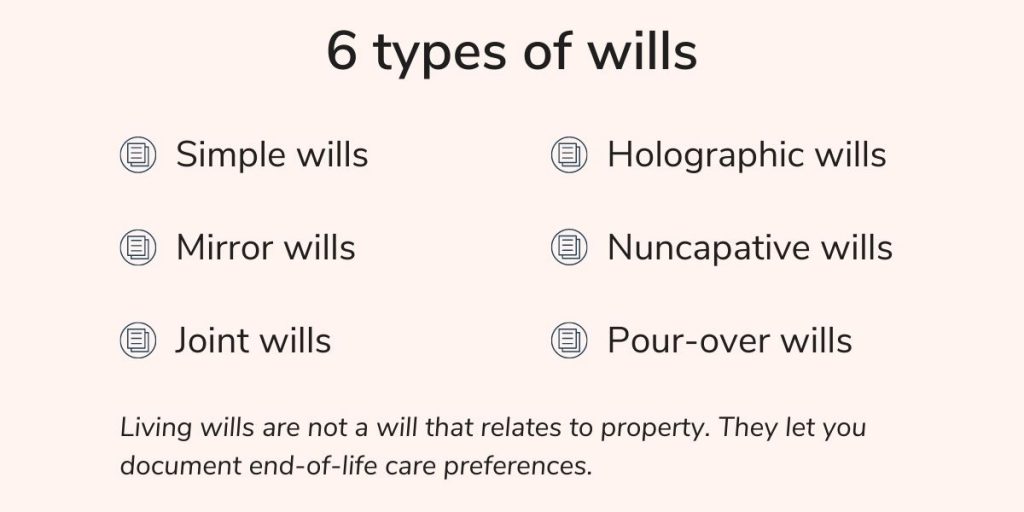A will is a legal document that explains how you want your property distributed after you die. Creating a will is one of the best ways you can protect and care for your loved ones.
Before you can make a will, you need to choose which type of will makes the most sense for your situation. There are several different will types you can consider when making your estate plans. Here’s how each of them work:
1. Living wills
Despite the name, a living will isn’t actually a will. Rather, it’s a legal document that lets you outline your end-of-life care preferences in case you become unable to communicate them. For example, your living will would go into effect if you were critically injured and left unconscious.
A living will lets you specify which medical treatments and medications you want, any you don’t want, and whether you want to be an organ donor. This helps you maintain control over your own healthcare and avoid putting the burden of potentially painful, or difficult, decisions on your loved ones.
Living wills are also known as “Advance Healthcare Directives,” and here’s how you can make one.

2. Simple wills
A simple will is a basic last will and testament. In it, you state who you want to have your property and assets after you die. Here’s what you should include in a simple will:
- State that the document is your will and reflects your final wishes.
- Name the people or organizations you want to inherit your property after you die. These heirs are called beneficiaries.
- Choose someone to carry out the wishes in your will. This person is known as your will executor.
- Name guardians to care for your minor children or pets, if you have them.
- Sign the will, and have at least two witnesses sign it as well. By signing, the witnesses promise that your will was truly written by you, and that you were of sound mind and not under pressure from someone else.
Don’t underestimate the power of a simple will! Despite its name, this type of will covers a lot of ground, and it’s enough for most people without complicated estates.
Through FreeWill, you can create your simple will online for free in as little as 20 minutes.
3. Mirror wills
Mirror wills are identical wills made by a married couple or domestic partners. With this will type, each partner leaves their entire estate to the other person. Each of them also name the same people and organizations as secondary beneficiaries of their property. This helps the couple ensure their partner’s financial security first before passing the estate onto their heirs.
4. Joint wills
Like mirror wills, joint wills are made by a couple to ensure the financial security of their partner. But unlike mirror wills, this will type is a single document that the couple makes and signs together. The single will combines the two partners’ wishes within the same document and can’t be changed without both of their agreement. This means that after one partner dies, the surviving partner can’t change the terms of the joint will, or who will get their property.
Since a joint will can’t be changed after one partner dies, most estate attorneys suggest making mirror wills instead.
5. Holographic wills
Despite the complicated-sounding name, holographic wills are as basic as they come. This type of will is written and signed by hand, sometimes without witnesses.
For some, handwriting a will may seem like the easiest way to create your last will and testament. But most estate attorneys warn against making a holographic will because not all US states accept them. For states that do, holographic wills need to meet some requirements in order to be held up in court, and these guidelines vary by state. For example, the executor may need to prove that the deceased person intended for the document to serve as a will. Often, the absence of witnesses for these wills can cause family members to challenge their validity.
Today’s technology and online resources make it easier than ever to create your will online and avoid the pitfalls of a holographic will.
6. Nuncupative wills, a.k.a. oral wills
Nuncupative wills are wills that are spoken aloud. This will type is sometimes called a “deathbed will” or “oral will.” They often happen because the testator thinks they’ll pass away soon and wants to communicate their wishes before they do.
Requirements for creating a legally valid nuncupative will vary widely from state to state. Some states don’t recognize them as legally valid at all. Of those that do, there may be other requirements, such as having a certain number of witnesses or writing down the wishes after they’re spoken.
7. Pour-over wills
Pour-over wills are used alongside a living trust. They state that any of the will-maker’s assets that aren’t named in the trust should be transferred to the trust once the will-maker dies.
One of the benefits of a living trust is that the assets in the trust avoid the cost and time of probate court. However, any assets that aren’t in your trust when you die will have to go through probate court before they can be transferred to the trust — even with a pour-over will.
Want to avoid probate? Create a living trust and pour-over will using FreeWill.
How to choose the right type of will for you
If you have a smaller, uncomplicated estate, a simple will is probably the best option for you. On FreeWill, you can fill out the documents for your legally-valid will online, then simply download, print, and follow the instructions for how to sign your forms with witnesses.
If you want to make sure that your spouse or partner inherits everything after you pass, you may want to create a joint will or mirror will together. Most estate planning attorneys recommend mirror wills for couples because these are much more flexible than joint wills, and can be changed after one partner passes away.
You can also create a will and testament alongside a living trust, aka a pour-over will. This is especially useful if you have a lot of assets, a complicated estate, or live in a state with a lengthy, expensive probate process, like California. Learn more about living trusts and how to set one up.
Thinking about handwriting your will? Most attorneys don’t recommend making holographic wills because their validity is often challenged in court. If you currently have a handwritten will, there are online resources that can help you quickly and easily create a legally-valid will.
If you have a more complicated, or large, estate, you may want to speak with an estate planning attorney to figure out the best options for you and your loved ones. You can save time and money by prepping your forms on FreeWill and then bringing them to an attorney to discuss.
Want to learn more? Read our complete guide to making a will.
Make your free estate plan today

Make your free advance healthcare directive

Make your free durable power of attorney

Make a stock donation today

Make your free revocable living trust










